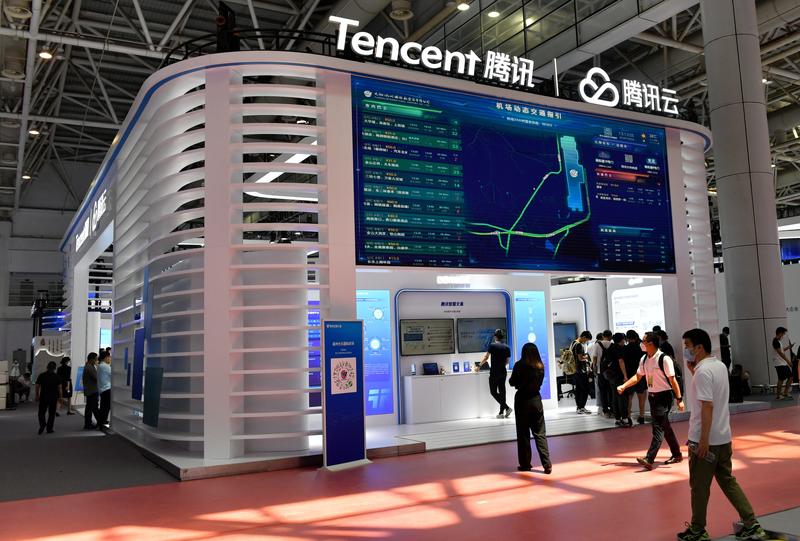Sector giants like Alibaba, Tencent expected to usher in new chapter of growth, overseas expansion in 2023
 Visitors check out Alibaba Cloud's intelligent industrial internet platform during the World Manufacturing Convention in Hefei, Anhui province, in September. (YUAN BIN / FOR CHINA DAILY)
Visitors check out Alibaba Cloud's intelligent industrial internet platform during the World Manufacturing Convention in Hefei, Anhui province, in September. (YUAN BIN / FOR CHINA DAILY)
The year 2022 saw an apparent slimming down of Chinese platform enterprises, with many of them cutting off unnecessary business undertakings amid China's antitrust efforts. Meanwhile, many of these operators strived to build up muscle in terms of industrial transformation to serve the real economy.
With healthy corrections, the country's platform enterprises, which mainly include internet and tech firms like Alibaba Group and Tencent Holdings, are expected to usher in a new chapter of growth and overseas expansion this year, said industry experts and company executives.
Wang Xiaoming, head of industrial and technological innovation at the Institute of Science and Development at the Chinese Academy of Sciences, said: "As an important part of the new economy, platform economy has undergone a period of healthy governance, coupled with gradual improvement of related laws and regulations, and it now has the conditions to radiate vitality and speed up further development. Amid internal and external economic uncertainties, enterprises are expected to play a better leading role in driving both domestic economic growth and global industrial advancement."
Shan Zhiguang, director of the information and industrial development department at the State Information Center, said: "Moving forward, a group of platform enterprises will lead digital transformation in various industrial sectors including consumption, entertainment, and medical care. They will drive the formation of several innovation ecosystems related to artificial intelligence, cloud computing, blockchain, big data and processors. It will be a new normal for major economies to compete in the above ecosystems."
 Visitors gather at Tencent's booth during an expo in Fuzhou, Fujian province, in July. (LYU MING / CHINA NEWS SERVICE)
Visitors gather at Tencent's booth during an expo in Fuzhou, Fujian province, in July. (LYU MING / CHINA NEWS SERVICE)
Positive support
The remarks were made following the tone-setting Central Economic Work Conference that took place in December. The meeting emphasized that platform companies will be supported to "fully display their capabilities" in bolstering economic growth, job creation and international competition.
It was at a critical moment that the government sent a strong supportive signal to develop the platform economy. At the 2020 Central Economic Work Conference, the central authorities pledged to prevent the "disorderly expansion of capital". In 2021, the conference maintained that the country should set red and green lights for capital market activity to prevent "haphazard growth".
Since 2020, a group of platform companies including Alibaba and Meituan, which had been engaging in monopolistic practices, underwent corrective measures. Data from the State Administration for Market Regulation showed that as of July, the market regulator had looked into over 100 cases of improper behavior and levied fines on 98 monopolistic instances in the internet sector.
Wei Jianguo, former vice-minister of commerce and vice-chairman of the China Center for International Economic Exchanges, said: "The conference has sent a strong signal that China will vigorously develop digital economy and encourage the development of the platform economy in the years to come. It is an affirmation from the government on the role of platform companies in driving economic growth, as well as encouragement for them to take another step forward now."
A white paper released by the China Academy of Information and Communications Technology, a government think tank, showed that the market scale of China's digital economy reached $7.1 trillion last year, which was the second-largest globally.
"This positive shift aims to enable platform companies to not only lead development in various business sectors in the domestic market, but also compete further on the global stage in the future. To some extent, China's platform economy is expected to usher in a new round of healthy development," Wei said.
Following the move, several authorities, including the top securities regulator and the central bank, are ramping up calls to support and facilitate the development of platform companies.
On Tuesday, Jin Zhuanglong, minister of the Ministry of Industry and Information Technology, said that more efforts will be made to deepen industrial transformation, including building a batch of 5G-connected factories, world-class intelligent factories, smart supply chains, and promoting such models to be used by more small and medium-sized enterprises.
Accelerated efforts will also be made to create a better environment for the development of digital economy, Jin added.
In late December, the China Securities Regulatory Commission said in a meeting that it will accelerate the process for approving "green light" cases for overseas listings of platform enterprises, and will work to implement the reform of the overseas listing system for such companies.
In a separate meeting chaired by Yi Gang, governor of the People's Bank of China — the central bank — Yi vowed to improve the level of normalized supervision over financial activities by platform companies and guide their financial business activities to develop in a standardized and healthy manner.
After the Central Economic Work Conference, many government officials paid visits to local tech and internet companies. Yi Lianhong, newly appointed Party chief of Zhejiang province, visited Alibaba's campus in December and urged the company to "become a model of normalized development and a leader of innovative development".
Beijing's Deputy Party Chief and Acting Mayor Yin Yong visited Meituan and Douyin — or TikTok — last Friday. Yin encouraged Meituan to play a bigger role in facilitating people's lives and helping more small and micro-sized enterprises to carry out digital transformation.
Yin also suggested Douyin further beef up investment in research and development and actively explore "the entrance for the next generation of internet development".
 Robots work on Meituan's automated sorting line during the 2022 World Robot Conference in Beijing in August. (PHOTO PROVIDED TO CHINA DAILY)
Robots work on Meituan's automated sorting line during the 2022 World Robot Conference in Beijing in August. (PHOTO PROVIDED TO CHINA DAILY)
Industrial transformation
With the government's support of platform economy, platform companies are getting more mature and becoming more focused in terms of industrial internet, as well as pruning their various business lines to focus on their major business activities and will invest more in technologies and services that serve the real economy.
Zhang Lei, founder and CEO of investment firm Hillhouse Capital Group, said: "Industrial internet is different from the past, and it needs companies to conduct business seriously. Investment should not lead to bubbles, but should become a catalyst between technological innovations and the real economy."
Peking University economist Justin Lin Yifu said in a note that China's advantages in digital economy can penetrate various industries in the real economy. Accelerating the digital transformation of industries will not only help increase the proportion of China's digital economy in its gross domestic product, making the proportion reach or even exceed that of developed economies, but also improve the quality and efficiency of manufacturing and the real economy, he said.
Tencent, which owns the country's largest social networking platform, announced its transformation to industrial internet years ago. In December, the Shenzhen, Guangdong province-based company said that it is looking to transform from "integrator to enabler and connector of other companies" for its cloud business to stay competitive amid an accelerated digital transformation.
"With the strategic transformation, Tencent aims to become a platform that can be integrated instead of acting as an integrator, which means becoming more focused on our own products and technologies, thus further enabling other companies," said Dowson Tong, senior vice-president of Tencent and CEO of Tencent's cloud and smart industries group, during the Tencent Digital Ecosystem Summit held in December.
Tong said that being an integrator requires a lot of experience, including stringing together different processes of an entire project, collecting different products, offering huge human capital support during bidding processes, making budgets with finance teams as well as communicating with customers.
"These are actually what Tencent was not good at before. By enabling ecosystem partners to do the integration work instead, win-win cooperation, rather than competition, will be formed among Tencent and other companies," he said.
Soon after the remarks, Tencent announced that it had formed a new unit to serve rather than compete with local telecommunications carriers.
Zhang Yong, board chairman and CEO of Alibaba, also said in July that it is embracing "both consumer and industrial internet businesses" and venturing into new growth areas.
"Alibaba has gained a deeper understanding of platform economy in the past year. A platform company needs to think more deeply about how much social value it can create, how many core technological bottlenecks it can solve and how to better support rural revitalization and become greener and more sustainable," Zhang said.
In December, Zhang also became acting president of Alibaba Cloud intelligence and enterprise communications app DingTalk, which, according to industry experts, showed that the cloud business, an important driver of industrial internet, has become more important to Alibaba's future.
"Alibaba, an e-commerce company and a platform enterprise, greatly empowers the real economy. It enables many low-skilled people to start businesses online, lowering the threshold for entrepreneurship, which is also a good way to achieve common prosperity," said Shi Hongxiu, a professor of economics at the National Academy of Governance.
"On the other hand, its cloud business directly serves industrial manufacturing and the real economy, as its technological innovations can be quickly turned into productive forces," Shi said.
According to data tracking company Qichacha, Alibaba Group's investments were tightened over the past two years, but still focused on its three main businesses of e-commerce logistics, corporate services and lifestyle-related services. The number of early-stage investments by Tencent in the entertainment sector has been declining, but corporate service investments have exceeded 16 cases since 2020, the highest ever.
Wind data showed that among all of the 280 US-listed Chinese companies, only 27 saw their share prices rise since the beginning of last year, accounting for less than 10 percent of the total. The market value of US-listed Chinese companies including Pinduoduo and JD shrank by more than $20 billion.
"Most of the current US industrial internet companies are multinationals that control the industrial chain and ecosystem. In this regard, China still has gaps," said Wang Changlin, president of the Academy of Macroeconomic Research.
Compared with the United States, China still lags behind in terms of industrial internet. Among the top 20 listed US technology companies, seven are related to industrial internet. But China doesn't have an industrial internet giant so far in the internet sector.
Wang said more efforts are needed to encourage these platform companies to do more innovations and compete on the global stage.
"Products will be good only after they can be used. It is necessary to increase government procurement policy support to encourage domestic enterprises to use domestic products, and improve the security level of the supply chain," he added.
Development amid regulation
Supporting the healthy development of platform companies doesn't mean a lack of regulation. In late December, China National Knowledge Infrastructure, the country's largest online academic database platform, was fined 87.6 million yuan ($12.72 million) for monopolistic behavior.
According to the State Administration for Market Regulation, since 2014, CNKI had abused its dominant market position to sell its database services at increasingly higher prices. The company had also restricted academic journals' and universities' ability to authorize the use of data by third parties through the signing of exclusive cooperation agreements.
Despite the already high fees for its services, CNKI had continued to increase its prices, with an annual average increase of about 10 percent seen for years. According to the penalty notice issued by the regulator, CNKI owned more than 95 percent of published Chinese academic papers, accounting for 90 percent of universities nationwide.
"The latest antitrust efforts on CNKI showed that China's antimonopoly efforts are getting normalized, under which the country aims to ultimately drive the development of various industries through proper regulation," said Zhong Gang, executive director of the Competition Law Research Institute at the East China University of Political Science and Law.
"The move will promote the free flow and dissemination of academic resources, reduce the cost of knowledge acquisition for consumers, and finally drive the fair and sound development of related markets," he said.
While supporting the digital economy, the Central Economic Work Conference also emphasized that the country will continue to improve the level of "normalized supervision", which, according to Wang Xianlin, a member of the expert advisory group of the State Council's antimonopoly commission, is aimed at creating a more predictable business environment.
"This means that the country will avoid sudden, intensive and special rectifications of improper behavior in platform economy in the future, which will be another firm support for platform companies to develop," Wang said.
A report by Sealand Securities said that given the importance of data elements and the important role of platform economy in employment and ensuring market supply, the upcoming policy is expected to be "more stable". And the next stage of supervision will set a clearer red line for platform companies, with the aim of promoting their development in a reasonable and legal manner, it said.
Zhu Keli, founding director of the China Institute of New Economy, said that a group of green light investment cases are likely to be announced soon, and detailed policies and measures to support the standardized and healthy development of platform economy are expected to be unveiled this year.
Green lights are mainly given to tech and internet investment deals, and those that can help boost the development of the real economy, Zhu said.
Contact the writers at liuweifeng@chinadaily.com.cn


